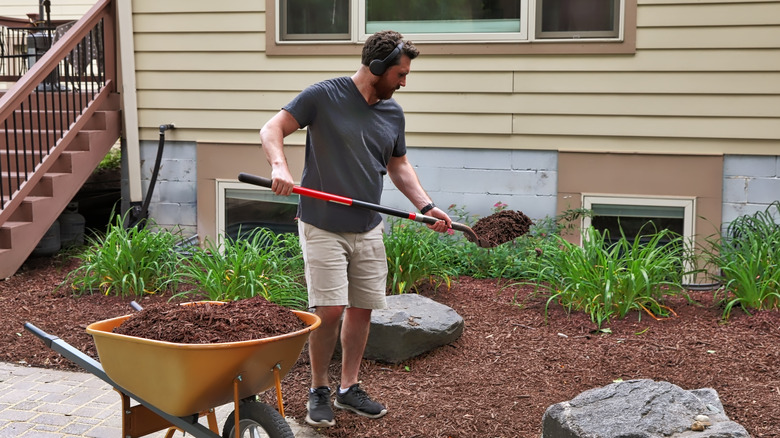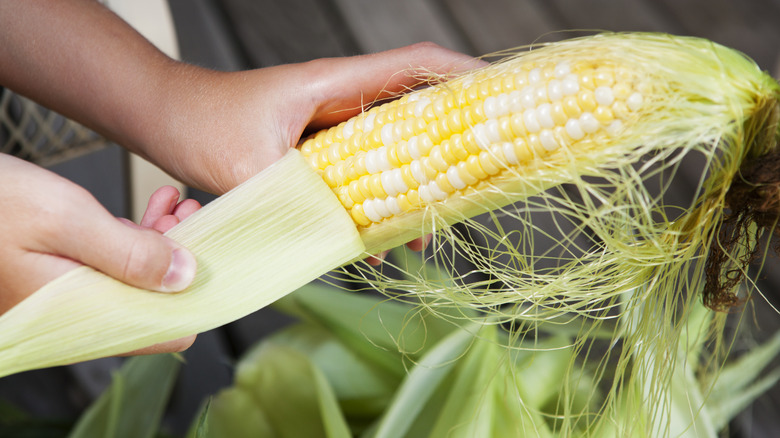The Garden Ingredient That Can Be Reused As Mulch
Mulching around the base of plants is an important and beneficial step that gardeners should take to foster a healthy garden. One common household food you likely eat from time to time is corn on the cob, and saving the husks and silk fibers from your compost pile is a great way to create your own mulch. These corn castoffs are typically discarded, but they can have incredible benefits in the garden when they are applied correctly as mulching materials. It's a simple and eco-friendly way to reuse your kitchen scraps and give back to your plants.
Using any kind of mulch in the garden at all will take a beginning gardener to the next level. To put it simply, mulching is essentially spreading a layer of materials over the surface of your garden in order to form a protective surface. Mulch can be made from biodegradable materials like wood chips or grass clippings, or more inorganic options like stones or seashells.
Mulching helps to conserve moisture in the soil by reducing evaporation, which is especially crucial during hot and dry periods. Secondly, mulch acts as a barrier, preventing weed growth and competition for nutrients and water. Additionally, mulch helps to regulate soil temperature, keeping it cooler in the summer and warmer in the winter, which promotes healthy plant growth. It can even help with soil erosion. Next time you're boiling up a bot of corn on the cob, set those corn husks and fibers aside for your garden.
How to turn corn husks into mulch
To use corn husks as gardening mulch, start by collecting the husks and silk fibers from corn on the cob in a large bucket. Next, soak the husks in water until they are fully hydrated and wet throughout. Soaking them prevents them from blowing away in the wind. Next, you'll want to spread the husks in a layer over your garden to protect your plants. When applying mulch, a good rule of thumb is to create a layer that is about 2 to 3 inches thick, enough to form an even layer of insulation.
Another step you may want to consider is to chop up the corn husks into smaller pieces. While you could do this in the kitchen, it may be tedious work and the silk fibers are often frustrating to work with. Instead, consider laying the husks out on your lawn and running them over with your mower. This is a much simpler and quicker solution. After shredding your corn husks you can either empty the mower bag of the chopped husks or rake the debris into a pile for easier spreading. If you used a mower bag, you may even get some grass clippings which also make a fantastic natural mulch that is free to you and great for your plants. Chopping the husks into smaller pieces encourages them to break down quicker, allowing the beneficial nutrients to make their way back into your garden soil.
Why corn husks work so well as mulch
Corn husks make excellent mulch for your garden beds for a number of reasons. First, using corn husks as mulch is a cost-effective and eco-friendly way to enhance the health and productivity of your garden. They conserve moisture, suppress weeds, regulate soil temperature, and enrich the soil with organic matter all from materials you were probably going to throw away in the first place. Rather than adding your husks to your compost pile or a landfill, fill your land with their beneficial properties.
Using corn husks as mulch benefits the garden in terms of returning nutrients to the soil when they break down because they are rich in organic matter. They contain valuable nutrients such as nitrogen, phosphorus, and potassium, all of which many plants depend on in order to grow and produce a healthy harvest. Nitrogen helps in the essential process of photosynthesis, leading to more vigorous growth and crop yields while phosphorus encourages stronger root growth and allows for better use of water. Lastly, potassium fosters strong stems and flower growth as well as enhancing drought resistance.
By adding corn husks to your garden, you can return these rich nutrients to the soil through their natural decomposition rather than casting them off and depleting your soil. This fertilization process is an excellent alternative to using inorganic mulches like recycled glass or brick chips that do not provide any vital nutrition for healthy soil.


